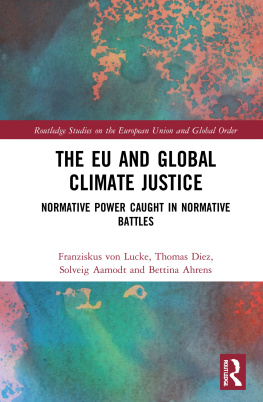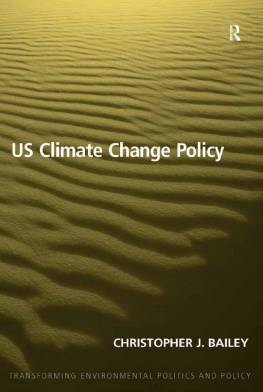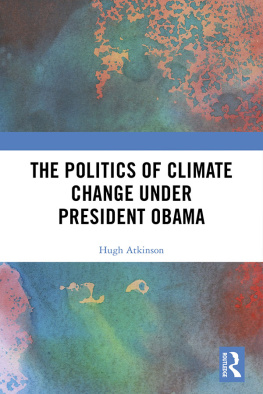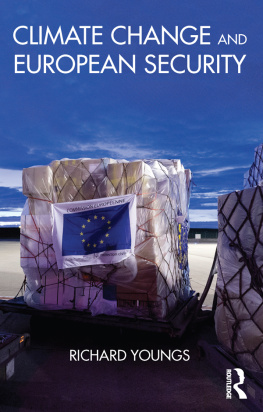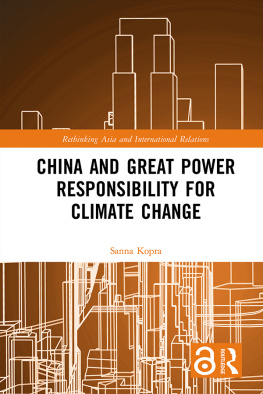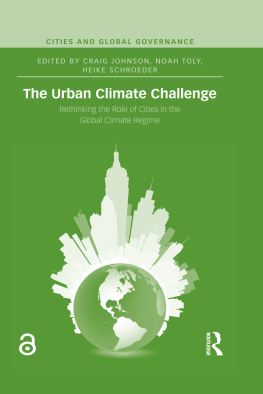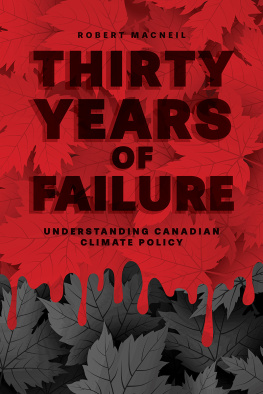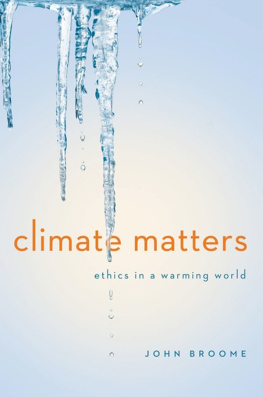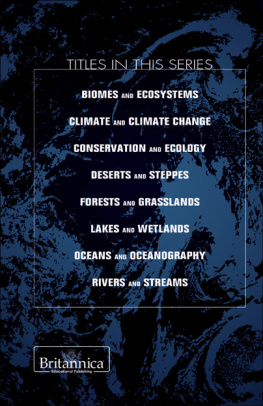The EU and Global Climate Justice
This book examines the European Union (EU)s contribution to the development of the global climate regime within the broader framework of global justice.
It argues that the procedural dimension of justice has been largely overlooked so far in the assessment of EU climate policy and reveals that the EU has significantly contributed to the development of the climate regime within its broader efforts to solidarise international society. At the same time, the book identifies deficits of the climate regime and limits to the EUs impact, and explains why the EU policy towards global climate change has shifted over time. Finally, it argues that these policies should not be assessed in terms of being either wholly positive or wholly negative, but that they are shot through with ambiguities.
This book will be of key interest to scholars, students, and practitioners of climate change, climate politics, and environmental and climate justice studies, and more broadly to EU Studies and International Relations.
Franziskus von Lucke is a Postdoctoral Researcher at the Institute of Political Science at the University of Tbingen, Germany.
Thomas Diez is Professor of Political Science and International Relations at the University of Tbingen, Germany.
Solveig Aamodt is a Reseacher at ARENA Centre for European Studies, University of Oslo, and a Senior Researcher at CICERO Center for International Climate Research, Oslo, Norway.
Bettina Ahrens is a Research Manager at the University of Stuttgart, Germany.
Routledge Studies on the European Union and Global Order
Series editor: Helene Sjursen, ARENA Centre for European Studies, University of Oslo, Norway.
Some critical voices notwithstanding, the scholarly debate on the EUs foreign policy role and its contribution to global values has rested on the assumption of the viability of a liberal world order with the EU at its vanguard. This series revisits this assumption.
The series analyses the external policies - and the response from external actors - of the European Union (EU) at a time of enhanced uncertainty, risk, and ambiguity. Drawing on a threefold conception of global political justice, it offers an innovative account of the EUs global role and relevance at a time of profound contestation over global norms. It delivers in-depth analyses of a set of core issues of global governance in which the EU has played a major role, amongst them migration, climate change, security and conflict, and development. Through these analyses, the Series re-conceptualises the EUs global role, and brings forth a new perspective on the crisis of the liberal world order; on what is at stake and for whom.
The EU and Global Climate Justice
Normative Power Caught in Normative Battles
Franziskus von Lucke, Thomas Diez, Solveig Aamodt and Bettina Ahrens
First published 2021
by Routledge
2 Park Square, Milton Park, Abingdon, Oxon OX14 4RN
and by Routledge
52 Vanderbilt Avenue, New York, NY 10017
Routledge is an imprint of the Taylor & Francis Group, an informa business
2021 Franziskus von Lucke, Thomas Diez, Solveig Aamodt and Bettina Ahrens
The right of Franziskus von Lucke, Thomas Diez, Solveig Aamodt and Bettina Ahrens to be identified as authors of this work has been asserted by them in accordance with sections 77 and 78 of the Copyright, Designs and Patents Act 1988.
All rights reserved. No part of this book may be reprinted or reproduced or utilised in any form or by any electronic, mechanical, or other means, now known or hereafter invented, including photocopying and recording, or in any information storage or retrieval system, without permission in writing from the publishers.
Trademark notice: Product or corporate names may be trademarks or registered trademarks, and are used only for identification and explanation without intent to infringe.
British Library Cataloguing-in-Publication Data
A catalogue record for this book is available from the British Library
Library of Congress Cataloging-in-Publication Data
A catalog record has been requested for this book
ISBN: 978-0-367-51160-9 (hbk)
ISBN: 978-1-003-08151-7 (ebk)
Typeset in Times New Roman
by codeMantra
1.1 The EU, normative power, and climate change
In few global policy arenas has the European Union (EU), together with its member states, been more active than in the field of climate change. While the United States (US) was the initial driving force for the adoption of international environmental policies in the late 1970s and 1980s, its interest in leading a global climate regime waned towards the end of the 1980s, and EU until 1993, European Community (EC) leadership became increasingly important. Indeed, following the Maastricht Treaty, climate change turned into one of the core international policy fields that the newly formed EU got involved in. Although it was certainly not the only important actor in getting the Kyoto Protocol agreed on and ratified, the decisive role of the EU in this process is undisputed (Wurzel and Connelly 2011b; Wurzel, Connelly, and Liefferink 2017; Adelle, Biedenkopf, and Torney 2018). Its internal Emissions Trading System (ETS), in effect since 2005, served as a model for emissions accounting when the 1997 Kyoto Protocol came into force in 2008. Kyoto was the first global climate agreement that included binding emission reduction targets, although one of its shortcomings was that it only compelled 38 so-called Annex I parties to such reductions. After Kyoto, the EU has made several attempts at achieving a universal regime with a more extensive reach or at least extending the duration of the Kyoto Protocol beyond the initially agreed end date of 2012.
These efforts culminated in the 2009 Copenhagen Summit, which was supposed to agree on a new climate treaty. Yet, negotiations failed and resulted in nothing more than a vague and non-binding declaration. In the years immediately following Copenhagen, the idea of a globally binding agreement was put on the back burner, and the EU stepped back from the foreground of the negotiations. When the international community eventually agreed on a new global framework in the 2015 Paris Agreement (PA), it was built on voluntary contributions and discursive pressure rather than binding rules. Yet the EUs role in achieving the PA is worth a second look. We suggest that it is perhaps better understood as the result of a learning process, which implied the acceptance of fundamental ambiguities in international society and thus led to a change of tactics, instruments, and basic understandings rather than resignation or a wholesale change of aims. The EU was important in forging the agreement in Paris, and during the negotiations it worked hard to include at least some obligatory elements. After Paris, actors within the EU started pushing for further action. In late 2019, the European Commission proposed its ambitious European Green Deal, which, if implemented, would at least in some respects restore the EUs position as a vanguard in the climate regime. However, some member state governments, including Hungary and Poland, remain sceptical and insist on a slower transformation.
How can we understand and assess the EUs global climate policy and its transformation over time? In this book, we look at this policy primarily from a global justice angle. We are interested in the ways in which the EUs global climate policy invokes justice concerns, implicitly or explicitly, how these concerns have shifted over time, to what effect, and how we may explain these shifts. As we will outline at greater length in

